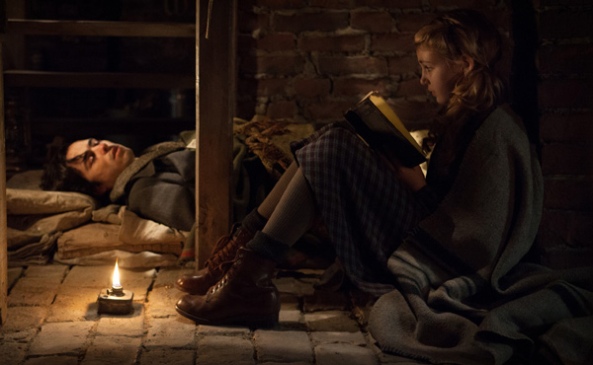There’s no rule that Nazi Germany be depicted only as gray with splashes of red swastika flags, but to see it prettied up in snow white colors for much of Brian Percival’s “The Book Thief” makes the contrasting themes a bit off-putting.
Although it gets a pass on the light-hearted and nuanced performances of its lead actors, “The Book Thief” forms an unholy marriage between historical melodrama and a childlike fable. It feels overly precious, and it becomes both tragic and whimsical to a fault.
Percival’s film is based on Markus Zusak’s novel of the same name, and it follows a little girl named Liesel (Sophie Nelisse of “Monsieur Lazhar”) as she’s being dropped off with a new German family. Her mother is a Communist on the run and her younger brother has just passed away from illness, and now Liesel is alone with her new father and mother, Hans and Rosa (Geoffrey Rush and Emily Watson).
Liesel cannot read and slowly begins to learn with her father, but when Hans takes in a sickly Jew on the run named Max (Ben Schnetzer), Liesel befriends him and helps nurse him back to health by reading him banned and stolen books.
So while “The Book Thief” has no direct fantastical element, its more fantasy driven feel comes in with its feather touch to all the melodrama. The houses are all covered in snow, cute little blonde boys play soccer in the street, Hans plays the accordion and Liesel recites ghost stories during air raids.
But “The Book Thief” is inherently about literature, and its dialogue is peppered with flowery prose and moments in which the actors are asked to linger on their words. “If your eyes could speak, what would they say,” Max asks Liesel as he requests a daily weather report.
The trouble is that Percival offers very little by way of literary appreciation. The fact that Hans provides Liesel with a basement full of walls on which to write vocabulary words is a detail that’s practically glossed over. Titles and authors are named dropped and Liesel is encouraged to be a writer, but it never reveals the magic she sees inside those pages, only the melodrama around her.
The more powerful moments come in the images that are rightfully made to be a disconcerting blend of emotions. The first is a Nazi children’s choir, in which all the kids dressed in bright yellow chant a propaganda piece as the camera pulls to a wide shot with Liesel in the dead center. Another shows a Nazi leader organizing a public book burning, and Percival cuts to more rapturous enthusiasm than he does reluctant faces.
Most troubling is the film’s ending, which feels tacked on and has an awful reveal in the form of the film’s narrator. It’s an example of how “The Book Thief” has trouble reconciling with the more painful historical elements while telling a pleasant childhood fairy tale, something that the written words of Zusak’s novel may capture much more seamlessly.
2 ½ stars
